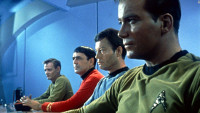 I’m grateful to Wired for publishing the article about Star Trek on its fiftieth anniversary that I would have if I’d had the necessary time and insight. It argues that the incoherent spectacle presently being peddled under the “Star Trek” name takes merely the set dressing from the original and discards what made the original a classic: its point of view.
I’m grateful to Wired for publishing the article about Star Trek on its fiftieth anniversary that I would have if I’d had the necessary time and insight. It argues that the incoherent spectacle presently being peddled under the “Star Trek” name takes merely the set dressing from the original and discards what made the original a classic: its point of view.
I’d only like to expand on that article’s point a bit, to say that the show’s point of view was not limited to politics. At its best, Star Trek was not merely a “blueprint for how to govern,” but a blueprint for how to live, teaching lessons about leadership, about balancing the head and the heart, about how to approach the unknown, and other evergreen questions about the human condition. These lessons were simplistic and moralistic, but to a young kid in Queens learning to make his way in the world during the golden age of nightly Star Trek reruns, they landed with all the more force for their simplicity.
The lesson of “A Taste of Armageddon,” in which Kirk forces a society to confront the true horrors of a centuries-old war that’s been mostly out of sight and out of mind? “War is hell.”
Of the time-travel story “The City on the Edge of Forever,” in which Kirk learns that to repair the broken timeline he must let the woman he loves die? “Leave well enough alone.”
Of “Amok Time,” in which Spock grieves, briefly believing he has killed Kirk in ritual combat while in the grip of the Vulcan mating fever? “Bros before hos.”
Of “The Ultimate Computer,” in which the advanced automation being tested to replace Kirk is revealed to be as deranged as its creator? “Garbage in, garbage out.”
Even after Star Trek graduated to the big screen, its best incarnation there, The Wrath of Khan, also embodied a simple lesson, suited to its maturing fan base: “You’re only as old as you feel.”
These are not merely glib captions. All the good episodes of classic Trek can be boiled down in this way, and taken together (and looking past the rubber alien costumes, the styrofoam rocks, the gauzy lenses used to shoot the occasional glamorous guest-actress, and the fair number of Trek episodes that were… less than classic), they amount to a viable, if patchy and now somewhat dated, handbook of manhood that shaped me and a whole generation of sci-fi nerds.
What can impressionable young fans take away from the current Star Trek films… other than how grumpy they make grandpa?